英语辩论—该不该过西方节日
- 格式:doc
- 大小:32.50 KB
- 文档页数:1
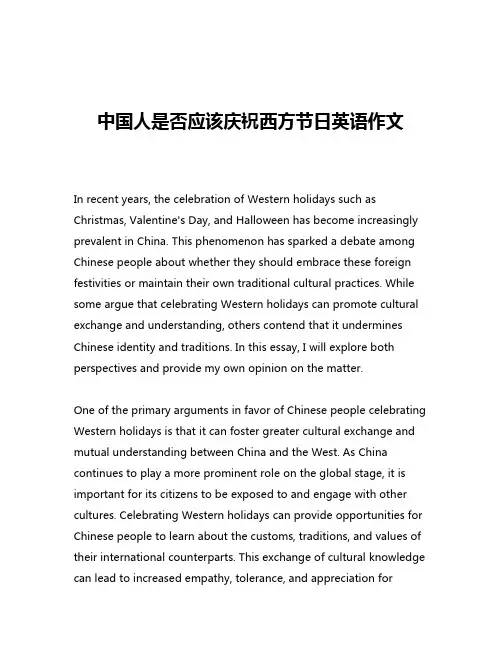
中国人是否应该庆祝西方节日英语作文In recent years, the celebration of Western holidays such as Christmas, Valentine's Day, and Halloween has become increasingly prevalent in China. This phenomenon has sparked a debate among Chinese people about whether they should embrace these foreign festivities or maintain their own traditional cultural practices. While some argue that celebrating Western holidays can promote cultural exchange and understanding, others contend that it undermines Chinese identity and traditions. In this essay, I will explore both perspectives and provide my own opinion on the matter.One of the primary arguments in favor of Chinese people celebrating Western holidays is that it can foster greater cultural exchange and mutual understanding between China and the West. As China continues to play a more prominent role on the global stage, it is important for its citizens to be exposed to and engage with other cultures. Celebrating Western holidays can provide opportunities for Chinese people to learn about the customs, traditions, and values of their international counterparts. This exchange of cultural knowledge can lead to increased empathy, tolerance, and appreciation fordiversity.Moreover, the celebration of Western holidays can also serve as a platform for Chinese people to share their own cultural heritage with the world. When Chinese people participate in these festivities, they can introduce aspects of their own traditions, such as traditional Chinese cuisine, music, and art, to a wider audience. This can help to promote a greater understanding and appreciation of Chinese culture on a global scale.Furthermore, the celebration of Western holidays can also have economic benefits for China. Many businesses in China, particularly in the retail and hospitality sectors, have capitalized on the growing demand for Western holiday-themed products and services. This has led to increased revenue and job opportunities for Chinese workers, which can contribute to the country's overall economic growth and development.However, opponents of the celebration of Western holidays in China argue that it undermines Chinese identity and traditional cultural practices. They contend that the adoption of these foreign festivities can lead to the gradual erosion of Chinese traditions and values, as people become increasingly disconnected from their own cultural heritage.One of the primary concerns raised by critics is that the celebration of Western holidays can overshadow or even replace traditional Chinese festivals and celebrations. For example, the increasing popularity of Christmas in China has led to a decline in the celebration of the Lunar New Year, which is a deeply rooted and culturally significant event in Chinese society. This shift away from traditional cultural practices can be seen as a threat to the preservation of Chinese identity and the transmission of cultural knowledge to future generations.Moreover, the celebration of Western holidays can also be viewed as a form of cultural imperialism, where the dominant Western culture is imposed upon and assimilated by other societies. This can be seen as a threat to the autonomy and self-determination of Chinese culture, as it can lead to the marginalization or suppression of traditional Chinese customs and beliefs.In conclusion, the debate over whether Chinese people should celebrate Western holidays is a complex and multifaceted issue. While there are arguments on both sides, I believe that a balanced approach is the most appropriate solution. Chinese people should strive to maintain and celebrate their own traditional cultural practices, while also embracing opportunities for cultural exchange and understanding with the West. By doing so, they can preserve their cultural identity while also fostering greater global connectivityand cooperation. Ultimately, the decision to celebrate Western holidays should be a personal choice, guided by an individual's own values, beliefs, and cultural affiliations.。
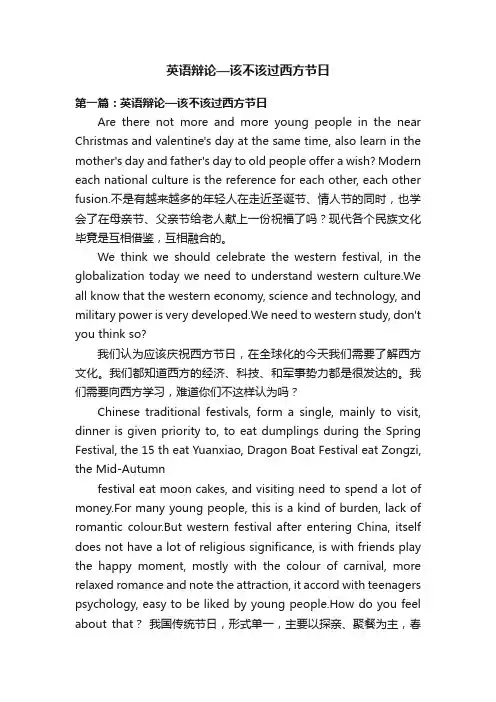
英语辩论—该不该过西方节日第一篇:英语辩论—该不该过西方节日Are there not more and more young people in the near Christmas and valentine's day at the same time, also learn in the mother's day and father's day to old people offer a wish? Modern each national culture is the reference for each other, each other fusion.不是有越来越多的年轻人在走近圣诞节、情人节的同时,也学会了在母亲节、父亲节给老人献上一份祝福了吗?现代各个民族文化毕竟是互相借鉴,互相融合的。
We think we should celebrate the western festival, in the globalization today we need to understand western culture.We all know that the western economy, science and technology, and military power is very developed.We need to western study, don't you think so?我们认为应该庆祝西方节日,在全球化的今天我们需要了解西方文化。
我们都知道西方的经济、科技、和军事势力都是很发达的。
我们需要向西方学习,难道你们不这样认为吗?Chinese traditional festivals, form a single, mainly to visit, dinner is given priority to, to eat dumplings during the Spring Festival, the 15 th eat Yuanxiao, Dragon Boat Festival eat Zongzi, the Mid-Autumnfestival eat moon cakes, and visiting need to spend a lot of money.For many young people, this is a kind of burden, lack of romantic colour.But western festival after entering China, itself does not have a lot of religious significance, is with friends play the happy moment, mostly with the colour of carnival, more relaxed romance and note the attraction, it accord with teenagers psychology, easy to be liked by young people.How do you feel about that?我国传统节日,形式单一,主要以探亲、聚餐为主,春节吃饺子,十五吃元宵,端午吃粽子,中秋吃月饼,而走探亲花费又很大,对于很多青年人来说过节反倒是一种负担,缺少浪漫色彩。
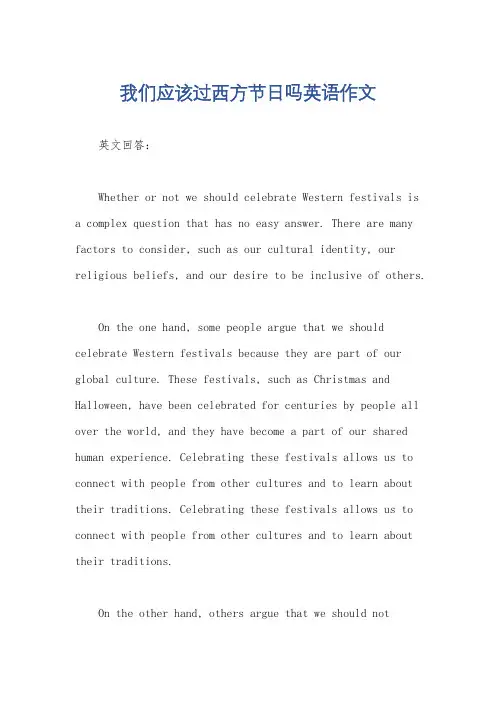
我们应该过西方节日吗英语作文英文回答:Whether or not we should celebrate Western festivals is a complex question that has no easy answer. There are many factors to consider, such as our cultural identity, our religious beliefs, and our desire to be inclusive of others.On the one hand, some people argue that we should celebrate Western festivals because they are part of our global culture. These festivals, such as Christmas and Halloween, have been celebrated for centuries by people all over the world, and they have become a part of our shared human experience. Celebrating these festivals allows us to connect with people from other cultures and to learn about their traditions. Celebrating these festivals allows us to connect with people from other cultures and to learn about their traditions.On the other hand, others argue that we should notcelebrate Western festivals because they are not part ofour own culture. These festivals, they say, are symbols of Western imperialism and colonialism, and they can be seenas a way of imposing Western values on other cultures. Celebrating these festivals, they argue, can be seen as a way of eroding our own cultural identity.Ultimately, the decision of whether or not to celebrate Western festivals is a personal one. There is no right or wrong answer, and each person must decide for themselves what is best for them. However, it is important to be aware of the different arguments on this issue and to make an informed decision.中文回答:我们是否应该过西方节日是一个复杂的问题,没有简单的答案。
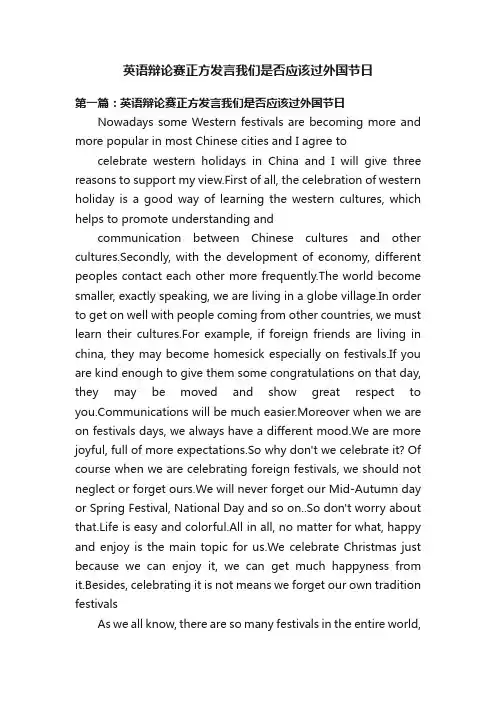
英语辩论赛正方发言我们是否应该过外国节日第一篇:英语辩论赛正方发言我们是否应该过外国节日Nowadays some Western festivals are becoming more and more popular in most Chinese cities and I agree tocelebrate western holidays in China and I will give three reasons to support my view.First of all, the celebration of western holiday is a good way of learning the western cultures, which helps to promote understanding andcommunication between Chinese cultures and other cultures.Secondly, with the development of economy, different peoples contact each other more frequently.The world become smaller, exactly speaking, we are living in a globe village.In order to get on well with people coming from other countries, we must learn their cultures.For example, if foreign friends are living in china, they may become homesick especially on festivals.If you are kind enough to give them some congratulations on that day, they may be moved and show great respect to munications will be much easier.Moreover when we are on festivals days, we always have a different mood.We are more joyful, full of more expectations.So why don't we celebrate it? Of course when we are celebrating foreign festivals, we should not neglect or forget ours.We will never forget our Mid-Autumn day or Spring Festival, National Day and so on..So don't worry about that.Life is easy and colorful.All in all, no matter for what, happy and enjoy is the main topic for us.We celebrate Christmas just because we can enjoy it, we can get much happyness from it.Besides, celebrating it is not means we forget our own tradition festivalsAs we all know, there are so many festivals in the entire world,including Chinese traditional festivals and Western festivals.I strongly disagree to celebrate western holidays in China and I will give two reasons to support my view.To begin with, western festivals have the cultural and historical origins in the western countries, which are unknown by Chinese people.There are so many western festivals, for example Christmas Day, which are originated from Christian and this is not believed in by the majority of Chinese people.We could not gain the happy feeling since we could not understand these holidays’ meanings.Most of us don’t believe in Christ, God or r eligions, and few of us know the meaning of Christmas I feel uncomfortable for a religious holidayFurthermore, there are so many meaningful traditional festivals in China, from which people could have a rest and get relax.As far as Chinese people are concerned, the Spring Festival is our favorite festival, which is celebrated by Chinese people no matter where they are.In the festival, without the burden of work, people call on relatives, visit their respected teachers, and chat with their best friends.Besides, there are other meaningful and instructive festivals in China, such as Autumn Day, National Day, Pure Bright Festival, etc.To sum up, there are different kinds of meaningful and adequate festivals in China to celebrate and western festivals’ backgroun d are unknown to Chinese people, so it should not be celebrated by us.反方问题1、We have a lot of traditional festivals, like the Spring Festival and the Mooncake Festival,But why should we celebrate western festivals?It’s right to lay emphasis on our traditional festivals but it’s not proper to reject the foreign ones on this account.As late Chairman Mao said: “Make the past serve the present andforeign things serve China.” In fact, China has been receiving some foreign festivals on a selective basis since the reform and opening like Christmas Day, Mother’s Day and Father’s Day, and are becoming popular festivals among the people.Besides, As a traditional Chinese festival and a typical Eastern culture, the Chinese Spring Festival is being observed by foreigners in many countries.2、As far as I know, some big cities like chongqing, the Christmas atmosphere is more joy and interesting than some cities in US.Chinese don't know why celebrate Christmas, but they are still do that zealously.Do you think whether it is good phenomenon to us?Although most people celebrate western holidays without knowing the meaning behind them.They just go shopping, hold parties and have fun..It’s not a bad thing for the people to take advantage of the western festivals, entertaining themselves, getting together and exchanging greetings.To the whole society, Christmas can stimulate the country’s economy and the people’s consumption, increase the income of tourism and catering industry and other entertainment industries, creating more social wealth.正方问题1、when it is Christmas,Most people, including me, get many messages or cards of Christmas best wishes from friends.Could you say western festivals give no entertainment to us?It is common knowledge that every nation has its own special festivals with colorful backgrounds, which are closely connected with its special history or excellent culture.So festivals are the products of the sedimentary accretion of a nation’s culture over thousands of years.such a festival as Christmas possesses strong religious sense and colors.I feel uncomfortable for a religiousholiday2、The celebration of western holiday is a good way of learning the western cultures, which helps to promote understanding and communication between Chinese cultures and other cultures.Could you say It is useless?Most of us don’t believe in Christ, God or religions, and few of us know the meaning of Christmas, what’s the point of celebrating it? Christmas is a festival full of religious colors and meanings for the Christians.If the non-Christians participate in the observance, they are subservient to foreigners.So let’s keep our mind on the traditional Chinese festivals instead.Today what we are debating the topic is whether we should celebrate other people's festivals?On the affirmative side we have and on the negative side we have Both teams have showed great debating ability in today's fierce competition.Let us now await for the adjudicator's scoring.I am sure it is going to be very close.And I think all contestants need to be congratulated for their outstanding efforts.The score is in, and the winner of today's debate isThan you all for coming.In recent years, many chinese, especially young people celebrate Christmas as one of the most important festivals.They buy Christmas gifts for their beloved ones and there are parties and many kinds of activities during Christmans season for people to enjoy.wherever you go on the streets, you always see shops selling Christmas trees and all kinds of delicate decorations, waiters wearing Christmas hats.Most people, including me, get many messages or cards of Christmas best wishes from friends.But meanwhile, some people stand against the practice of celebrating Christmas among the Chinese people.they said we should keep to our own tradition and there is no reason to observe a foreign festival.第二篇:英语辩论赛(学生是否应该穿校服,正方)Hello, Kehan.Hello Jenny!I recently read a piece of news , it said there was a survey in a large forum , which was whether students should be forced to wear uniforms.85.7% of the participants voted ‘Yes’, while 2.2% voted ‘No’.In my opinion, it has its reason that this tradition can exist among countries with different development degrees of education all over the world.For schools, uniform can be a reflection of a school’s appeara nce and a symbol of a school.It can make a school look neat instead of looking like a place of public community or somewhere.It’s easier to manage the students and point out the different people to ensure the safety of students.I have learned that serious violence in school occurred frequently, especially the things in Jiangxi and Zhejiang.So my point is it’s better for students to wear uniforms.Well , that’s a good point, but I want to say, for students, uniforms can also be the signs of them.It can remind students who they are and what they should do.Junior and high school students are mostly in adolescence and often express their feelings through the clothing that they wear, if they keep focusing on this kind of behavior, then they will miss the other part of individuality establishment.Wearing uniforms can alleviate this problem and reduce the situation of material comparisons made by dressing in order to let the students put their more energy on the study rather than what they should wear today.In that way, every one looks equal no matter handsome or not so handsome.Therefore, I believe it’s better for students to wear uniforms.第三篇:《安乐死是否应该合法化》正方观点《安乐死应该合法化》理论建议一、理论核心建议将“人的权利生来平等,安乐死是人权的重要体现”作为正方立论的基础,也是打破反方观点的基本锐器。
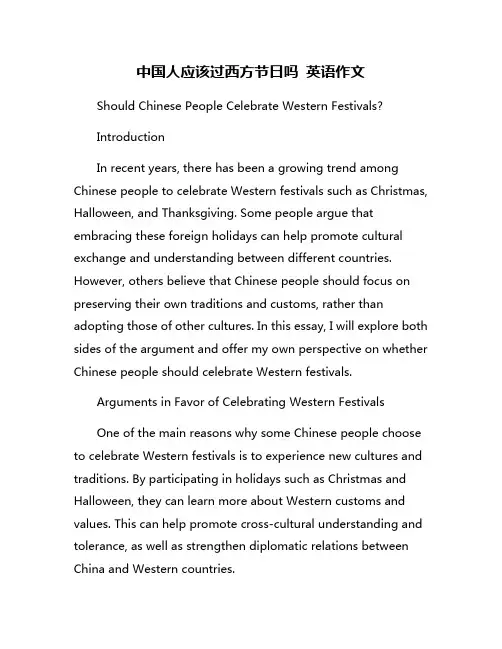
中国人应该过西方节日吗英语作文Should Chinese People Celebrate Western Festivals?IntroductionIn recent years, there has been a growing trend among Chinese people to celebrate Western festivals such as Christmas, Halloween, and Thanksgiving. Some people argue that embracing these foreign holidays can help promote cultural exchange and understanding between different countries. However, others believe that Chinese people should focus on preserving their own traditions and customs, rather than adopting those of other cultures. In this essay, I will explore both sides of the argument and offer my own perspective on whether Chinese people should celebrate Western festivals.Arguments in Favor of Celebrating Western FestivalsOne of the main reasons why some Chinese people choose to celebrate Western festivals is to experience new cultures and traditions. By participating in holidays such as Christmas and Halloween, they can learn more about Western customs and values. This can help promote cross-cultural understanding and tolerance, as well as strengthen diplomatic relations between China and Western countries.Furthermore, celebrating Western festivals can also be a fun and enjoyable experience for Chinese people. For many, these holidays offer an opportunity to relax and spend time with friends and family. The colorful decorations, delicious food, and festive atmosphere can bring joy and excitement to people's lives, and provide a welcome break from the routine of everyday life.In addition, some argue that embracing Western holidays can be a way for Chinese people to show their openness and willingness to engage with the global community. By participating in these festivals, they can demonstrate their cosmopolitan outlook and willingness to embrace diversity. This can help improve China's image on the world stage and promote a more inclusive and welcoming society.Arguments Against Celebrating Western FestivalsOn the other hand, there are also valid reasons why some people believe that Chinese people should not celebrate Western festivals. One of the main concerns is that by adopting foreign holidays, Chinese people may neglect their own traditions and cultural heritage. China has a rich history and a diverse range of customs and festivals, and some worry that these may be overshadowed by Western influences.Furthermore, there are also concerns about the commercialization of Western festivals in China. Many businesses see these holidays as an opportunity to boost sales and profits, often promoting extravagant decorations and lavish celebrations. This can lead to a superficial and materialistic approach to holidays, rather than a focus on their cultural and spiritual significance.Some also argue that the growing popularity of Western festivals in China can contribute to a sense of cultural imperialism, where Western norms and values are seen as superior to those of other cultures. This can lead to a loss of cultural identity and a homogenization of global culture, where traditional practices and beliefs are eroded in favor of Westernization.My PerspectiveIn my opinion, I believe that Chinese people can and should celebrate Western festivals, as long as they do so in a respectful and mindful way. It is important to remember that cultural exchange is a two-way street, and that embracing foreign holidays does not mean abandoning one's own traditions. By participating in Western festivals, Chinese people can gain a greater appreciation for diversity and different ways of life.However, it is also crucial to preserve and promote China's own cultural heritage. This can be done by continuing to celebrate traditional festivals such as Chinese New Year,Mid-Autumn Festival, and Dragon Boat Festival, and by passing down customs and rituals to future generations. By maintaining a balance between embracing new traditions and honoring old ones, Chinese people can create a rich and vibrant cultural tapestry that reflects their unique history and identity.ConclusionIn conclusion, the question of whether Chinese people should celebrate Western festivals is a complex and nuanced issue. While there are valid arguments on both sides of the debate, I believe that cultural exchange and dialogue can help bring people together and foster mutual understanding. By celebrating Western holidays in a thoughtful and respectful manner, Chinese people can enrich their lives and broaden their horizons, while still preserving their own traditions and customs.。
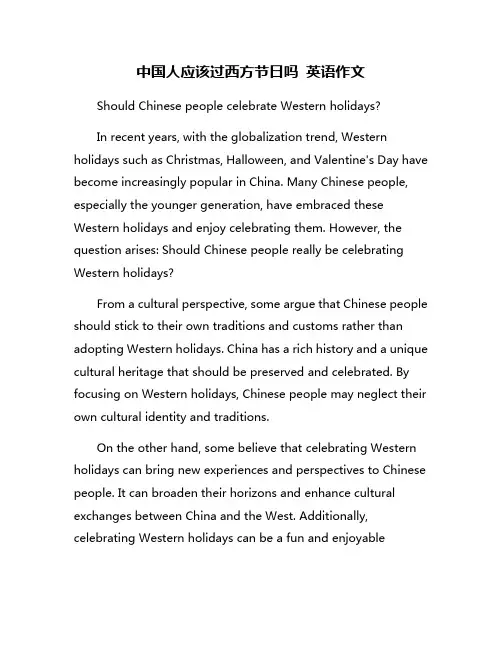
中国人应该过西方节日吗英语作文Should Chinese people celebrate Western holidays?In recent years, with the globalization trend, Western holidays such as Christmas, Halloween, and Valentine's Day have become increasingly popular in China. Many Chinese people, especially the younger generation, have embraced these Western holidays and enjoy celebrating them. However, the question arises: Should Chinese people really be celebrating Western holidays?From a cultural perspective, some argue that Chinese people should stick to their own traditions and customs rather than adopting Western holidays. China has a rich history and a unique cultural heritage that should be preserved and celebrated. By focusing on Western holidays, Chinese people may neglect their own cultural identity and traditions.On the other hand, some believe that celebrating Western holidays can bring new experiences and perspectives to Chinese people. It can broaden their horizons and enhance cultural exchanges between China and the West. Additionally, celebrating Western holidays can be a fun and enjoyableexperience for many Chinese people, providing a break from the daily routine and adding excitement to their lives.Moreover, in today's globalized world, cultural exchange is inevitable. Western holidays have already become a part of Chinese society, and many businesses and retailers have capitalized on the commercial opportunities they bring. Therefore, it may be unrealistic to expect Chinese people to completely ignore Western holidays.Ultimately, whether Chinese people should celebrate Western holidays is a personal choice. Some may choose to embrace these holidays as a way to explore different cultures and have fun, while others may prefer to focus on traditional Chinese festivals. As long as individuals respect both their own cultural heritage and that of others, there should be no conflict in celebrating Western holidays in China.In conclusion, the issue of whether Chinese people should celebrate Western holidays is a complex one with valid arguments on both sides. While it is important to preserve and promote Chinese traditions, it is also beneficial to embrace cultural diversity and celebrate different holidays. As long as Chinese people approach Western holidays with an open mind and a respectful attitude, there should be no harm inparticipating in these celebrations. After all, holidays are meant to bring joy and happiness, regardless of their origin.。
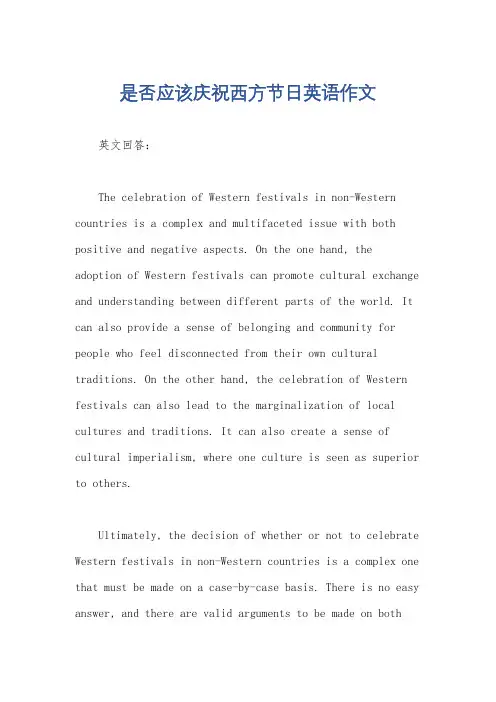
是否应该庆祝西方节日英语作文英文回答:The celebration of Western festivals in non-Western countries is a complex and multifaceted issue with both positive and negative aspects. On the one hand, the adoption of Western festivals can promote cultural exchange and understanding between different parts of the world. It can also provide a sense of belonging and community for people who feel disconnected from their own cultural traditions. On the other hand, the celebration of Western festivals can also lead to the marginalization of local cultures and traditions. It can also create a sense of cultural imperialism, where one culture is seen as superior to others.Ultimately, the decision of whether or not to celebrate Western festivals in non-Western countries is a complex one that must be made on a case-by-case basis. There is no easy answer, and there are valid arguments to be made on bothsides of the issue. However, it is important to be aware of the potential benefits and drawbacks of celebrating Western festivals before making a decision.中文回答:在非西方国家庆祝西方节日是一个复杂且多方面的议题,它有正面和负面影响。
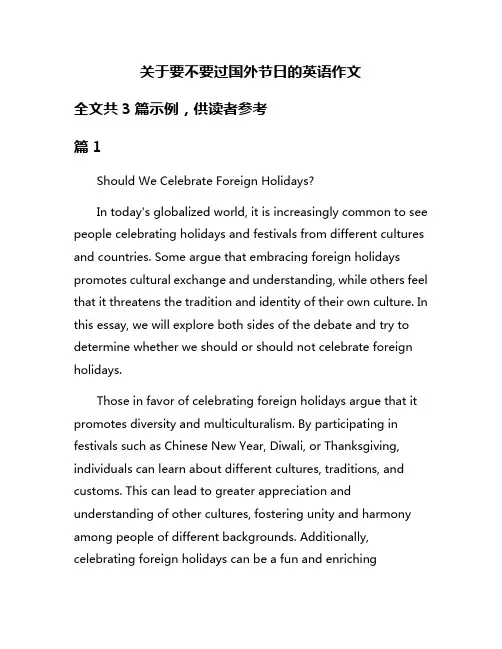
关于要不要过国外节日的英语作文全文共3篇示例,供读者参考篇1Should We Celebrate Foreign Holidays?In today's globalized world, it is increasingly common to see people celebrating holidays and festivals from different cultures and countries. Some argue that embracing foreign holidays promotes cultural exchange and understanding, while others feel that it threatens the tradition and identity of their own culture. In this essay, we will explore both sides of the debate and try to determine whether we should or should not celebrate foreign holidays.Those in favor of celebrating foreign holidays argue that it promotes diversity and multiculturalism. By participating in festivals such as Chinese New Year, Diwali, or Thanksgiving, individuals can learn about different cultures, traditions, and customs. This can lead to greater appreciation and understanding of other cultures, fostering unity and harmony among people of different backgrounds. Additionally, celebrating foreign holidays can be a fun and enrichingexperience, allowing individuals to try new foods, learn new dances, and participate in unique rituals.Furthermore, celebrating foreign holidays can have economic benefits for local communities. For example, cities that host festivals like Oktoberfest or Carnival can attract tourists from around the world, boosting the local economy and creating jobs. In this way, embracing foreign holidays can contribute to the cultural and economic development of a region.On the other hand, some argue that celebrating foreign holidays can lead to the dilution of one's own culture and traditions. They fear that by adopting holidays from other countries, people may forget or neglect their own cultural heritage. This could result in the loss of unique traditions, values, and practices that have been passed down through generations. In some cases, the commercialization of foreign holidays may also lead to the exploitation of cultural symbols and practices for profit, which can be seen as disrespectful and offensive.Moreover, some critics believe that celebrating foreign holidays encourages cultural appropriation, where elements of a minority culture are adopted by members of the dominant culture without understanding or respecting their significance. This can perpetuate stereotypes and misrepresentations of aculture, leading to misunderstandings and conflicts between different groups of people.In conclusion, the debate over whether we should celebrate foreign holidays is a complex and multifaceted issue. While there are valid arguments on both sides, it is important to approach the topic with an open mind and a respect for diversity. Ultimately, the decision to celebrate foreign holidays should be made with sensitivity and awareness of the cultural implications involved. By fostering a spirit of inclusivity and understanding, we can create a more harmonious and culturally rich society for future generations.篇2Should We Celebrate Foreign Holidays?The world is becoming more interconnected than ever before, with people from different cultures interacting on a daily basis. Along with this cultural exchange comes the sharing of traditions and holidays from around the world. Some people argue that it is important to embrace and celebrate foreign holidays as a way to promote diversity and understanding among different cultures. However, others believe that it is important to preserve one's own cultural heritage and traditions,and that adopting foreign holidays can dilute one's sense of identity.There are several reasons why one might choose to celebrate foreign holidays. One of the main arguments in favor of celebrating foreign holidays is that it promotes diversity and understanding among different cultures. By participating in the traditions and customs of another culture, people can gain a deeper appreciation for the values and beliefs of that culture. This can help to break down barriers and foster greater understanding and respect among people from different backgrounds.Furthermore, celebrating foreign holidays can also be a fun and enriching experience. It can be an opportunity to learn about different cultural practices, taste new foods, and participate in unique traditions. For example, celebrating Chinese New Year can involve watching dragon dances, eating dumplings, and giving red envelopes for good luck. These experiences can be both educational and enjoyable, and can help to broaden one's horizons and worldview.On the other hand, there are also valid reasons why some people choose not to celebrate foreign holidays. One argument against celebrating foreign holidays is that it can dilute one'ssense of cultural identity. By adopting the traditions of another culture, some people worry that they might lose touch with their own cultural heritage. This can be particularly important for marginalized or minority cultures that are at risk of losing their traditions in the face of globalization.Additionally, some people argue that it is important to preserve and protect one's own cultural traditions. These traditions are often passed down through generations and hold deep significance for many people. By focusing on foreign holidays, some worry that these important cultural practices might be forgotten or lost over time. For example, celebrating Thanksgiving in a country where it is not traditionally observed might mean overlooking the importance of local harvest festivals or traditional feasts.In conclusion, the decision of whether or not to celebrate foreign holidays is a personal one that depends on individual beliefs and values. While there are valid arguments on both sides of the debate, ultimately the most important thing is to approach cultural exchange with an open mind and a spirit of respect. By learning about and appreciating different traditions, we can help to foster greater understanding and empathy among people from all walks of life. So, whether you choose tocelebrate foreign holidays or not, remember to always approach cultural exchange with an open heart and an open mind.篇3Should We Celebrate Foreign Festivals?In today's globalized world, it is not uncommon for people to celebrate festivals and holidays from different cultures and countries. Whether it be Halloween, Christmas, or Chinese New Year, these foreign festivals have become more and more popular in countries all around the world. However, the question arises: should we celebrate foreign festivals?On one hand, celebrating foreign festivals can be a fun and educational experience. It gives us the opportunity to learn about different cultures, traditions, and customs. It can also help us to appreciate the diversity and richness of the world. For example, celebrating Diwali, the Hindu festival of lights, can allow us to learn about the significance of the festival, the rituals involved, and the history behind it. This can be a truly enriching experience for both adults and children.Furthermore, celebrating foreign festivals can also help to promote cultural exchange and understanding. It can bring people from different backgrounds together and foster a senseof unity and inclusivity. By participating in foreign festivals, we can show respect and appreciation for other cultures, and build bridges between different communities. This can be especially important in today's increasingly divided world, where cultural misunderstandings and stereotypes are all too common.However, on the other hand, some argue that celebrating foreign festivals can lead to cultural appropriation. Cultural appropriation is when people from a dominant culture adopt elements of a marginalized culture without understanding or respecting their significance. This can be harmful and disrespectful to the original culture, as it takes away from their traditions and beliefs. For example, wearing a Native American costume for Halloween without understanding the cultural significance of the attire can be seen as offensive and disrespectful.In addition, some may argue that by focusing on foreign festivals, we are neglecting our own cultural heritage and traditions. It is important to remember and preserve our own customs and celebrations, as they are a part of our identity and history. By constantly adopting foreign festivals, we may risk erasing our own cultural roots and uniqueness.In conclusion, whether we should celebrate foreign festivals is a complex and nuanced issue. While celebrating foreign festivals can be a fun and educational experience that promotes cultural exchange and understanding, it is important to do so respectfully and not at the expense of our own traditions. Ultimately, it is up to each individual to decide whether or not they want to partake in foreign festivals, taking into consideration the cultural significance and impact of their actions.。

中国人该不该过洋节英语作文建议全文共3篇示例,供读者参考篇1Title: Should Chinese People Celebrate Western Festivals?In recent years, the celebration of Western festivals, such as Christmas, Valentine's Day, and Halloween, has become increasingly popular in China. While some people embrace these festivities as a way to experience different cultures and have fun, others argue that Chinese people should not celebrate Western holidays because they are not a part of traditional Chinese culture and values. In this essay, we will explore both sides of the debate and provide suggestions on whether Chinese people should or should not celebrate Western holidays.On one hand, those who support the celebration of Western festivals in China argue that it is a fun way to experience different cultures and traditions. Participating in activities such as decorating Christmas trees, exchanging gifts on Valentine's Day, and dressing up for Halloween can provide a sense of excitement and joy for people of all ages. Additionally, celebrating Western holidays can also foster cultural exchange and understandingbetween China and the rest of the world. By embracing different traditions and customs, Chinese people can broaden their horizons and appreciate the diversity of global cultures.On the other hand, there are those who believe that Chinese people should not celebrate Western festivals because they are inauthentic and do not align with traditional Chinese values. Some critics argue that the commercialization of Western holidays has led to a superficial and materialistic approach to these celebrations, which goes against the simplicity and sincerity of Chinese traditions. Furthermore, some people see the adoption of Western holidays as a form of cultural imperialism, where Western values and norms are imposed on Chinese society, leading to the erosion of indigenous cultural identity.In light of these arguments, it is important for Chinese people to carefully consider whether they should celebrate Western festivals or not. While there is no right or wrong answer, here are some suggestions to help individuals make an informed decision:1. Reflect on personal values and beliefs: Before participating in Western holidays, take some time to reflect on your own values and beliefs. Consider whether celebrating these festivals aligns with your cultural identity and principles.2. Educate yourself on the origins and meanings of Western holidays: Understanding the history and significance of Western festivals can provide insights into the cultural context behind these celebrations. By learning more about the traditions and customs associated with these holidays, you can make more informed decisions about whether or not to participate.3. Find a balance between traditional and modern celebrations: Instead of completely rejecting Western holidays, consider finding a balance between traditional Chinese festivals and Western festivities. This can allow you to enjoy the best of both worlds while maintaining a connection to your cultural roots.4. Support local traditions and customs: Celebrating traditional Chinese festivals is a great way to honor and preserve the rich cultural heritage of China. By participating in events such as the Spring Festival, Mid-Autumn Festival, and Dragon Boat Festival, you can contribute to the preservation of indigenous customs and traditions.In conclusion, whether Chinese people should celebrate Western festivals is a complex and nuanced issue that requires careful consideration. While there are valid arguments on both sides of the debate, it ultimately comes down to individualpreferences and beliefs. By reflecting on personal values, educating oneself on different cultures, finding a balance between traditional and modern celebrations, and supporting local traditions, Chinese people can navigate the complexities of cultural exchange and make informed decisions about how to engage with Western holidays. As long as celebrations are done with respect, understanding, and an open mind, there is no harm in embracing the diversity of global cultures and enjoying the festivities that bring people together.篇2Should Chinese People Celebrate Foreign Festivals?In recent years, Chinese people have shown an increasing interest in celebrating foreign festivals such as Christmas, Halloween, and Valentine's Day. While some see it as a way to embrace other cultures and have fun, others argue that it goes against traditional values and promotes commercialism. This essay will explore the pros and cons of celebrating foreign festivals and provide some suggestions for Chinese people in deciding whether or not to participate in these events.One of the main arguments in favor of celebrating foreign festivals is that it can help promote cultural exchange andunderstanding. By participating in events such as Christmas or Halloween, Chinese people can learn more about customs and traditions from other countries, which can in turn improve communication and foster mutual respect. Additionally, celebrating foreign festivals can be a fun and exciting way to break the routine of everyday life and bring people together in a spirit of joy and festivity.On the other hand, there are also valid concerns about the impact of celebrating foreign festivals on traditional Chinese culture and values. Some believe that by focusing on foreign holidays, Chinese people are neglecting their own traditions and customs, which could lead to a loss of cultural identity. Moreover, the commercialization of foreign festivals, with an emphasis on buying gifts and decorations, can contribute to consumerism and materialism, which may not align with Chinese values of simplicity and modesty.So, what should Chinese people do when it comes to celebrating foreign festivals? Here are a few suggestions:1. Remember the importance of cultural heritage: While it's okay to participate in foreign festivals occasionally, it's essential to remember and respect your own cultural traditions. Make sureto celebrate traditional Chinese holidays and customs, and pass them down to future generations.2. Find a balance: Instead of completely rejecting or blindly embracing foreign festivals, try to find a balance between the two. You can participate in foreign holidays while also incorporating elements of Chinese culture into the celebrations.3. Support local traditions: When celebrating foreign festivals, try to support local businesses and artisans by purchasing decorations and gifts that are made in China. This can help promote traditional craftsmanship and support the local economy.In conclusion, whether Chinese people should celebrate foreign festivals or not is a personal choice that each individual needs to make based on their own values and beliefs. While there are benefits to embracing other cultures, it's essential to strike a balance and remember the importance of preserving traditional customs and values. By being mindful of cultural heritage, finding a balance between foreign and local traditions, and supporting local traditions, Chinese people can make informed decisions about how to celebrate festivals from around the world.篇3Should Chinese people celebrate Western festivals?With the globalization of cultures, it has become common for people around the world to celebrate festivals from different cultures. In China, Western festivals such as Christmas, Valentine's Day, and Halloween have gained popularity in recent years. However, this trend has raised concerns about the impact of Western festivals on Chinese traditions and culture. In this essay, we will discuss whether Chinese people should celebrate Western festivals and provide recommendations on how to strike a balance between embracing foreign cultures and preserving our own traditions.One of the arguments in favor of celebrating Western festivals is the cultural exchange and understanding that it fosters. By participating in Western holidays, Chinese people can learn more about the customs and traditions of other cultures, which can help promote mutual respect and appreciation. Additionally, celebrating Western festivals can be a fun and enjoyable way to break the routine and add some excitement to our lives.On the other hand, some people argue that the growing popularity of Western festivals in China is eroding our own traditions and cultural identity. In recent years, there has been a trend of commercialization and westernization of traditional Chinese holidays, such as the Lunar New Year and Mid-Autumn Festival. This has raised concerns about the loss of our cultural heritage and the homogenization of global cultures.In light of these concerns, it is important for Chinese people to approach the celebration of Western festivals with caution and thoughtfulness. While it is good to embrace diversity and learn about other cultures, it is equally important to value and preserve our own traditions. Here are some recommendations on how to strike a balance between celebrating Western festivals and preserving Chinese culture:1. Understand the origins and significance of Western festivals. Before celebrating a foreign holiday, take the time to learn about its history and traditions. This can help you appreciate the cultural significance of the festival and avoid appropriating it for commercial purposes.2. Incorporate elements of Chinese culture into the celebration of Western festivals. For example, you can combine traditional Chinese decorations and foods with Western holidaycustoms to create a unique and meaningful celebration that reflects both cultures.3. Support local businesses and artisans. Instead of buying mass-produced decorations and products for Western festivals, consider purchasing handmade or locally sourced items that showcase Chinese craftsmanship and culture.4. Educate others about Chinese traditions and customs. Take the opportunity to share your cultural heritage with friends and colleagues who may be less familiar with Chinese traditions. This can help promote cross-cultural understanding and appreciation.In conclusion, the celebration of Western festivals in China can be a positive and enriching experience if approached with mindfulness and respect for our own traditions. By striking a balance between embracing foreign cultures and preserving our own cultural heritage, we can create a harmonious and vibrant society that celebrates diversity and inclusivity. As Chinese people, let us embrace the world with an open heart and a proud spirit of our cultural identity.。
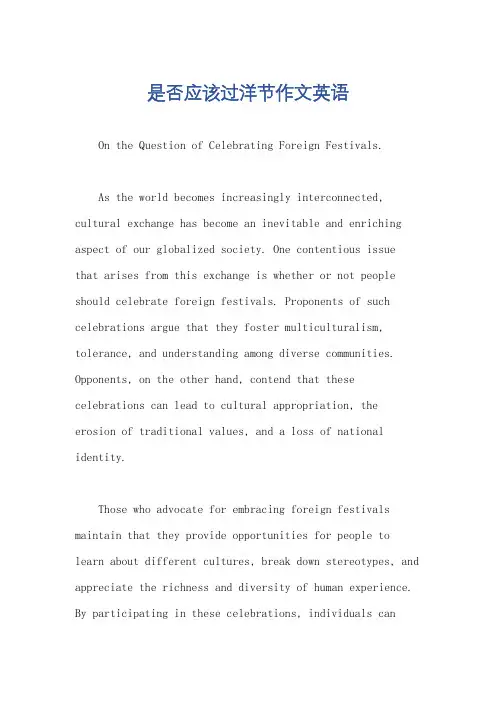
是否应该过洋节作文英语On the Question of Celebrating Foreign Festivals.As the world becomes increasingly interconnected, cultural exchange has become an inevitable and enriching aspect of our globalized society. One contentious issuethat arises from this exchange is whether or not people should celebrate foreign festivals. Proponents of such celebrations argue that they foster multiculturalism, tolerance, and understanding among diverse communities. Opponents, on the other hand, contend that these celebrations can lead to cultural appropriation, the erosion of traditional values, and a loss of national identity.Those who advocate for embracing foreign festivals maintain that they provide opportunities for people to learn about different cultures, break down stereotypes, and appreciate the richness and diversity of human experience. By participating in these celebrations, individuals cangain a deeper understanding of the world around them, develop a sense of global citizenship, and cultivate empathy for people from different backgrounds.Moreover, festivals can serve as a bridge between communities, fostering unity and cohesion. When people from different cultures come together to celebrate a shared experience, they create a sense of commonality that transcends their differences. This shared experience can help to build friendships, foster cooperation, and promote social harmony.Proponents also argue that celebrating foreignfestivals enriches the cultural landscape of society. By introducing new traditions, customs, and artistic expressions, foreign festivals add vibrancy and diversity to the cultural tapestry. This can stimulate creativity, innovation, and a broader appreciation for the arts.However, opponents of celebrating foreign festivals raise valid concerns about cultural appropriation and the potential erosion of traditional values. Culturalappropriation occurs when individuals or groups adopt elements of a minority culture without understanding or respecting their significance. This can lead to the commodification and trivialization of cultural practices, as well as the erasure of their historical and spiritual context.Additionally, some critics argue that the widespread celebration of foreign festivals can lead to a decline in the appreciation and practice of traditional festivals. They fear that as people become more drawn to the novelty and excitement of foreign celebrations, they may neglect the festivals that have been passed down through generations within their own culture. This can result in a loss of cultural identity and a weakening of the bonds that unite communities.In weighing the arguments for and against celebrating foreign festivals, it is important to strike a balance between embracing cultural diversity and preserving traditional values. One approach is to encourage selective celebration, where people choose to participate in foreignfestivals that resonate with them while also maintaining a deep appreciation for their own cultural heritage.It is also crucial to ensure that foreign festivals are celebrated with respect and understanding. Individuals should make an effort to learn about the origins and significance of these festivals, and avoid engaging in behaviors that could be seen as disrespectful or offensive. By approaching foreign festivals with sensitivity and open-mindedness, we can minimize the risk of cultural appropriation and foster genuine cultural exchange.Ultimately, the decision of whether or not to celebrate foreign festivals is a personal one. However, by carefully considering the arguments presented above, individuals can make informed choices that balance the benefits of cultural exploration with the importance of preserving their own cultural identity. By embracing foreign festivals with respect and intentionality, we can create a truly inclusive and vibrant society that celebrates the rich diversity of human culture while honoring the traditions that have shaped our past and present.。
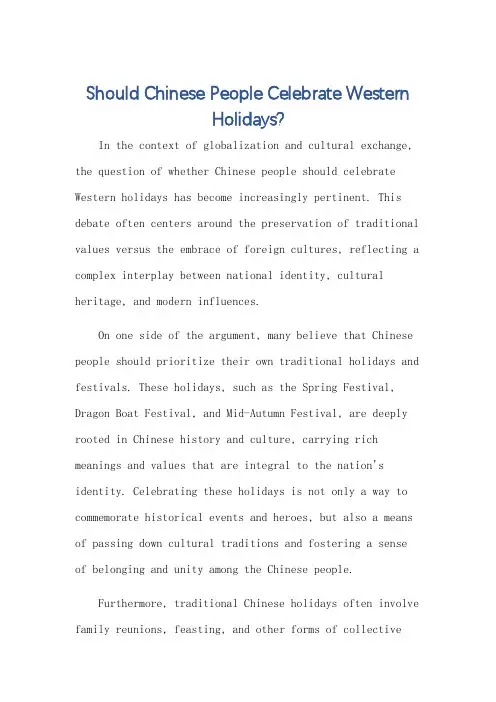
Should Chinese People Celebrate WesternHolidays?In the context of globalization and cultural exchange, the question of whether Chinese people should celebrate Western holidays has become increasingly pertinent. This debate often centers around the preservation of traditional values versus the embrace of foreign cultures, reflecting a complex interplay between national identity, cultural heritage, and modern influences.On one side of the argument, many believe that Chinese people should prioritize their own traditional holidays and festivals. These holidays, such as the Spring Festival, Dragon Boat Festival, and Mid-Autumn Festival, are deeply rooted in Chinese history and culture, carrying rich meanings and values that are integral to the nation's identity. Celebrating these holidays is not only a way to commemorate historical events and heroes, but also a means of passing down cultural traditions and fostering a sense of belonging and unity among the Chinese people.Furthermore, traditional Chinese holidays often involve family reunions, feasting, and other forms of collectivecelebration, promoting strong social bonds and a sense of community. These aspects of Chinese culture are unique and cannot be replicated by Western holidays, which tend to focus more on individualistic pursuits like gift-giving and consumerism.However, the other side of the argument maintains that Chinese people should not be averse to celebrating Western holidays. In today's interconnected world, cultural exchange and diversity are essential for promoting mutual understanding and respect between different cultures. Western holidays, such as Christmas, Valentine's Day, and Thanksgiving, offer Chinese people an opportunity to learn about and appreciate Western cultures, traditions, and values.Moreover, these holidays provide a platform for socializing and having fun, often bringing people together from different backgrounds to share joy and celebration. While these holidays may not carry the same historical and cultural significance as traditional Chinese holidays, they can still be enjoyed as a way to broaden cultural horizons and enrich personal experiences.Of course, it is important to strike a balance between celebrating Western holidays and preserving Chinese traditions. This can be achieved by integrating elements of both cultures into celebrations, or by alternating between celebrating Western and Chinese holidays. For instance, families could choose to celebrate Christmas with a traditional Western meal followed by a Chinese-style fireworks display, or they could combine Valentine's Day with traditional Chinese expressions of love and affection. In conclusion, the question of whether Chinese people should celebrate Western holidays is not a straightforward one. While preserving and promoting traditional Chinese holidays is undoubtedly important for maintaining cultural identity and heritage, embracing Western holidays can also be beneficial in terms of cultural exchange, mutual understanding, and personal enrichment. The key is to find a balance that respects and honors both cultures while allowing individuals to enjoy and celebrate in a way thatis meaningful and enjoyable to them.**中国人是否应该过洋节**在全球化和文化交流的大背景下,中国人是否应该庆祝西方节日的问题日益凸显。
应不应该庆祝西方节日英语作文English:It is a matter of personal choice whether one should celebrate Western holidays. On one hand, participating in Western holidays can foster cultural exchange and understanding between different parts of the world, promoting global unity and tolerance. It provides an opportunity for people to learn about traditions, values, and customs from diverse cultures, enriching their own perspectives and experiences. Additionally, celebrating Western holidays can be a form of appreciation for the cultural diversity that exists in our interconnected world. However, it is important to approach the celebration of Western holidays with respect and sensitivity, recognizing that not everyone may share the same enthusiasm or cultural background. It's crucial to avoid cultural appropriation and to instead engage in meaningful and respectful ways that honor the traditions and meanings behind these holidays. Ultimately, whether one chooses to celebrate Western holidays should depend on individual beliefs, values, and intentions, as long as it's done with an open mind and respectful attitude towards different cultures.中文翻译:庆祝西方节日是个人选择的问题。
文章标题:Embracing or Preserving: The Dilemma of Western HolidaysIn the globalized era, western holidays have increasingly penetrated into non-western cultures, sparking debates on whether to embrace these festivals or to stick to traditional ones. This issue is not merely about celebrating different dates, but rather reflects the collision and fusion of diverse cultures.On the one hand, embracing western holidays can be seen as a symbol of modernization and globalization. These festivals often come with a rich cultural heritage and a vibrant celebration atmosphere, attracting people from all walks of life. For instance, Christmas, Valentine's Day, and Halloween have become increasingly popular worldwide, with people engaging in various activities such as gift-giving, romantic dates, and costume parties. These celebrations not only bring joy and excitement, but also promote cultural exchange and understanding.Furthermore, embracing western holidays can also serve as a means of relaxing social norms and breaking away from traditional routines. In some cultures, traditional festivals might be associated with rigid traditions and expectations, which can sometimes be restrictive. By contrast, western holidays often offer a more relaxed and casual atmosphere, allowing individuals to express their creativity and uniqueness.However, on the other hand, preserving traditional holidays is also crucial for maintaining cultural identity and heritage. Traditional festivals are often deeply rooted in a culture's history, mythology, and values, reflecting the unique characteristics of a nation or community. By celebrating these festivals, people are able to reconnect with their cultural roots and pass down their traditions to future generations.Moreover, traditional holidays often have deeper meanings and significances that are not easily replicated by western festivals. For instance, the Chinese New Year is not just a time for family reunions and feasting, but also a moment of reflection on the past year and setting goalsfor the new one. Such meaningful traditions are essential for maintaining a culture's cohesion and continuity.In my opinion, the debate over embracing or preserving western holidays is not an either-or choice. Instead, it is about finding a balance between respecting and preserving our own cultural heritage while also opening up to new cultural experiences. We can celebrate western holidays as a way of enjoying the joy and excitement they bring, while also maintaining our traditional festivals as a means of preserving our cultural identity and heritage.By doing so, we not only enrich our own cultural lives, but also contribute to the global cultural diversity and harmony. In the end, it is not the festivals themselvesthat matter, but rather the values and meanings we ascribe to them and the way we use them to connect with our past, present, and future.**拥抱还是保留:西方节日的困境**在全球化的时代,西方节日越来越多地渗透到非西方文化中,引发了关于是否应该拥抱这些节日或坚持传统节日的争论。
是否应该过西方节日英语作文The debate on whether Western holidays should be celebrated has been ongoing for years. On one hand, proponents argue that embracing these global festivities can foster cross-cultural understanding and promote unity. On the other hand, critics contend that preserving local traditions is crucial and that adopting foreign celebrations may undermine cultural identity. In this essay, I will examine both perspectives and provide a balanced analysis on this contentious issue.Firstly, advocates of celebrating Western holidays often emphasize the benefits of cultural exchange and globalization. In an increasingly interconnected world, they argue, exposure to diverse customs and traditions can broaden our horizons and promote mutual understanding. Festivals such as Christmas, Halloween, and Valentine's Day, for instance, have become widely celebrated across the world, transcending their Western origins. Participating in these events can provide opportunities for people to learn about different cultures, share experiences, and foster a sense of global community.Moreover, proponents suggest that the adoption of Western holidays can have positive economic implications. Many businesses and industries thrive during these festive seasons, generating employment opportunities and boosting local economies. The influx of tourists, the demand for holiday-related products and services, and the overall increase in consumer spending can all contribute to economic growth. This can be particularly beneficial for developing countries seeking to diversify their revenue streams and capitalize on the growing international market.Furthermore, supporters of Western holiday celebrations contend that they can serve as a platform for social and political engagement. These events can be leveraged to raise awareness about important issues, advocate for social causes, and bring people together to celebrate shared values of unity, tolerance, and inclusivity. For instance, the LGBTQ+ community has often utilized Pride celebrations, which originated in the West, to promote visibility, advocate for equal rights, and foster a sense of solidarity among marginalized groups.On the other hand, critics of Western holiday celebrations argue that preserving local traditions and cultural identity should be the primary concern. They assert that the widespread adoption of foreign festivities can lead to the erosion of indigenous customs and values, which are essential for maintaining cultural diversity and authenticity.Many non-Western societies have their own rich histories, festivals, and celebrations that are deeply rooted in their respective belief systems, social structures, and historical narratives. Replacing or diluting these cherished traditions with Western counterparts can be perceived as a form of cultural imperialism, undermining the unique identity and heritage of these communities.Additionally, opponents of Western holiday celebrations contend that they may perpetuate harmful stereotypes, promote consumerism, and reinforce power imbalances between the Global North and the Global South. For example, the commercialization of Christmas, with its emphasis on gift-giving and material excess, can be seen as a manifestation of Western capitalist values that may not align with the values and priorities of non-Western societies. Similarly, the portrayal of certain Western holidays, such as Halloween, can sometimes be perceived as insensitive or disrespectful towards local customs and beliefs.Moreover, critics argue that the adoption of Western holidays can also have unintended consequences on the social fabric of non-Western societies. The introduction of these festivities may disrupt traditional family structures, gender roles, and community-based celebrations, leading to a potential erosion of social cohesion and communal ties. This can be particularly problematic in cultures where collective identity and shared traditions are deeply valued.In conclusion, the debate on whether Western holidays should be celebrated is a complex and multifaceted issue. While the proponents highlight the benefits of cultural exchange, economic opportunities, and social engagement, the critics emphasize the importance of preserving local traditions and cultural identity. Ultimately, the decision on whether to embrace Western holidays should be made with careful consideration of the unique cultural, social, and historical contexts of each society. A balanced approach that seeks to strike a harmonious balance between global interconnectedness and local authenticity may be the most prudent path forward.。
中国人应该过西方节日吗英语作文English: It is a personal choice whether Chinese people celebrate Western holidays or not. Some Chinese individuals may feel inclined to adopt Western holidays due to globalization, exposure to Western culture, or simply a desire to partake in the festivities. For some, celebrating Western holidays may also be a way to connect with friends or family members who live abroad or have Western origins. However, there are also those who prefer to stick to traditional Chinese festivals and cultural practices, viewing Western holidays as foreign customs that do not align with their values or beliefs. Ultimately, whether or not Chinese people choose to celebrate Western holidays should be left to individual preference and cultural identity.中文翻译: 中国人是否应该过西方节日是个人选择。
一些中国人可能会因为全球化、接触到西方文化,或者只是渴望参与节日庆祝而倾向于采纳西方节日。
【导语】阅读英语美⽂会给⼤家带来与众不同的感受,多读英语也有利于提升我们的英语能⼒,欢迎阅读为⼤家精⼼整理的“⾼中英语作⽂:中国⼈应该庆祝西⽅节⽇吗?”!更多相关讯息请关注! 【篇⼀】中国⼈应该庆祝西⽅节⽇吗?Should Chinese Celebrate Western Festivals?Today, more and more young people are crazy about western festivals. When western festivals come, they usually go to restaurants or shopping malls to have fun.如今,越来越多的年轻⼈都对西⽅的节⽇着迷。
当西⽅节⽇到来的时候,他们常常去餐厅或是商场娱乐。
Why do the young enjoy western festivals so much? Since they worship everything new, and they can’t resist the temptation. In their opinions, western festivals symbolize the fashion, while our Chinese traditional festivals are out of date. No wonder we always feel so boring during our traditional holidays. If we still turn a blind eye to our traditional festivals, our culture and civilization will disappear someday. Accordingly, it is high time for us to pay close attention to our Chinese festivals. 为什么年轻⼈这么喜爱西⽅节⽇呢?⼤抵是因为他们喜爱新鲜事物,抗拒不了诱惑。
我们是否应该庆祝西方节日英语作文Should We Celebrate Western Holidays?Hello everyone! Today, I want to talk about whether we should celebrate Western holidays. Some people think it's a lot of fun to celebrate holidays like Christmas and Halloween, while others believe we should only celebrate our own traditional festivals. Let's explore both sides of the argument!First, let's talk about why celebrating Western holidays can be exciting. Western holidays are different from our traditional festivals, and they bring a sense of novelty and adventure. For example, during Christmas, we can decorate Christmas trees, exchange gifts, and sing beautiful carols. It's a great opportunity to learn about different cultures and customs. Plus, who doesn't love the idea of Santa Claus bringing presents?Moreover, celebrating Western holidays helps us improve our English skills. We get to learn new words and phrases related to these festivals. By participating in activities liketrick-or-treating on Halloween, we can practice speaking English with our friends and neighbors. It's like having a language lesson in a fun and interactive way!On the other hand, some people argue that we should focus only on our own traditional festivals. They believe that by celebrating Western holidays, we might forget our own culture and traditions. They think it's important to preserve our customs and pass them on to future generations. After all, our traditional festivals have a deep historical and cultural significance.In addition, some Western holidays are not directly related to our beliefs and values. For example, Halloween has its roots in Western superstitions and folklore, which might not resonate with everyone. Instead of adopting foreign holidays, we could put more effort into celebrating our own festivals, which have meaningful stories and teachings behind them.So, should we celebrate Western holidays or not? In my opinion, it's all about finding a balance. We can embrace the joy and excitement of Western holidays while still cherishing our own traditions. It's important to respect and learn about different cultures, but we should never forget our own roots. By celebrating a variety of festivals, we can broaden our horizons and develop a global perspective.In conclusion, celebrating Western holidays can be a lot of fun and a great way to learn about other cultures. It also helps us improve our English skills. However, we should also rememberthe importance of our own traditional festivals and the values they represent. By striking a balance between the two, we can enjoy the best of both worlds. Let's celebrate diversity and make every festival a special and memorable occasion!That's all for today, my friends. Thank you for listening!。
Are there not more and more young people in the near Christmas and valentine's day at the same time, also learn in the mother's day and father's day to old people offer a wish? Modern each national culture is the reference for each other, each other fusion.
不是有越来越多的年轻人在走近圣诞节、情人节的同时,也学会了在母亲节、父亲节给老人献上一份祝福了吗?现代各个民族文化毕竟是互相借鉴,互相融合的。
We think we should celebrate the western festival, in the globalization today we need to understand western culture. We all know that the western economy, science and technology, and military power is very developed. We need to western study, don't you think so?
我们认为应该庆祝西方节日,在全球化的今天我们需要了解西方文化。
我们都知道西方的经济、科技、和军事势力都是很发达的。
我们需要向西方学习,难道你们不这样认为吗?
Chinese traditional festivals, form a single, mainly to visit, dinner is given priority to, to eat dumplings during the Spring Festival, the 15 th eat Yuanxiao, Dragon Boat Festival eat Zongzi, the Mid-Autumn festival eat moon cakes, and visiting need to spend a lot of money. For many young people, this is a kind of burden, lack of romantic colour. But western festival after entering China, itself does not have a lot of religious significance, is with friends play the happy moment, mostly with the colour of carnival, more relaxed romance and note the attraction, it accord with teenagers psychology, easy to be liked by young people. How do you feel about that?
我国传统节日,形式单一,主要以探亲、聚餐为主,春节吃饺子,十五吃元宵,端午吃粽子,中秋吃月饼,而走探
亲花费又很大,对于很多青年人来说过节反倒是一种负担,缺少浪漫色彩。
而西方节日在进入中国后,其本身不具有很
多的宗教意义,成为朋友相聚的美好日子,大多带有狂欢色彩,比较轻松浪漫,又注重情调,适合年轻人求新求变的心
理,容易为年轻人所喜爱并接受。
你对此有什么看法吗?
We recognize that should carry forward Chinese traditional culture, but now the whole
world together, with their respective cultural influences, in carrying forward traditional Chinese
culture at the same time, we also have the freedom of Western holidays.
但是什么节日又不危害环境呢?清明节,在节日期间也会产生许多垃圾,浪费很多东西。
E: But what holidays do not harm to the environment. Like the TOOB SWEEPING Festival, during the festival, also can produce a lot of waste, waste a lot of things.。